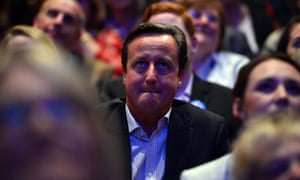It was Diana, of course, who opened the floodgates of tears that swept away the notion of the British “stiff upper lip”. The public mourning at her death was seen as a turning point for a nation where emotional repression had been a point of pride. So it seems fitting that this week it is her sons, William and Harry, who are warning us that our emotional journey is not yet over.
Last week, Prince Harry described how he went for counselling after repressing his own grief over the loss of his mother led to a two-year period of anxiety, anger and “total chaos”. This week, his brother, the Duke of Cambridge, has gone on to warn in an interview that keeping “a stiff upper lip” should not be at “the expense of your health”.
More than 25 years since Paul Gascoigne’s famous tears during the 1990 World Cup made him a national hero, haven’t we moved on from this buttoned-up stereotype? From Barack Obama crying over the death of children at Sandy Hook to Vladimir Putin shedding tears at a victory rally, these days even world leaders are unafraid to show their emotions. Yet, as consultant clinical psychologist Sally Austen points out, such public weeping invariably takes the form of “tidy tears”. The emotion we accept, or even encourage, in public figures is still controlled. “To be with someone who is crying snot and choking on their sadness takes a level of courage for which we might not yet be ready,” she says.
For individuals, the terror that strong emotions will overwhelm us remains deep-seated. “The fears are underpinned by negative automatic thoughts; powerful, often unexamined thoughts that affect the choices we make, often without us even noticing. This leads us to worry that, ‘If I start crying I will never stop’ or, ‘If I cry my colleagues will lose all respect for me’, and even, ‘I can’t cry because I need to look after everyone else’.”
This can come at a cost. “People who might be classed as emotionally ‘strong’ – the stiff upper lipped – are more likely to end up with depression or PTSD than those who recognise their need to express their feelings,” she says.
It’s not hard to find pockets of nostalgia for the idea of a stiff upper lip in the UK, fuelled in part by a hankering for a time when boarding school-bred army officers were moulded to take charge of the empire. A recent Sky News article, for example, railed against “thin-skinned millennials” as it mourned the loss of the days when tough “ploughmen and labourers” were “led by youth from the middle and upper classes tempered and toughened in the forges of public school”.
The journalist Alex Renton, whose book about the dark side of boarding schools is titled Stiff Upper Lip: Secrets, Crimes and the Schooling of a Ruling Class, says this is what makes William’s words “stunning”. “Those three words are understood across the world to sum up a sense of British reserve and resilience and qualities that, to many people, are what made Britain great. It’s the core creed of the empire. The notion that the British were exceptional and the best rulers the world has known through the training of being tough and taking things on the chin is very strong. So it’s pretty revolutionary to have one of the titular heads of a nation say it’s not always a good thing and that speaking up might be better.”

Psychotherapist Philippa Perry says an old French and Saunders sketch neatly sums up the problem with the stiff upper lip. In it, a caricature of a “hunting, shooting and fishing” woman accidentally chops off her finger and, rather than crying, throws it to her nearby dog. When another dog starts barking for a similar treat, she cuts off another finger. This, says Perry, illustrates “how ridiculous it is not to listen to your feelings”.
“The stiff upper lip type thinks there are only two options,” she says. “Either you try to put [your emotions] in a box” or you “allow them to be the horses to your chariot – you are led around by them. Of course, there is a middle way – when you hear and listen to your feelings, and are guided, but not led by them.” This, she says, is the difference between allowing your emotions to “spill out everywhere”, and containing them.
By refusing to acknowledge our own emotions, Perry argues, we risk losing our ability to empathise with others. The long-term effects can be detrimental. Counselling psychologist Victoria Galbraith says: “There is still this idea that men need to ‘keep it together’. Suicide is much greater among younger men, which might be down to them feeling they have to keep these things to themselves. Having the opportunity to talk to people … I can’t overemphasise how positive that is.
“If we keep our emotions in, they come out somehow. That can be through poor physical health in time, or anger outbursts or taking things out on other people. It’s almost impossible for it not to have an impact – it’s about how soon we choose to engage with the emotions we experience.”
Linda Blair says she has noticed a change in the UK’s attitude in the near 40 years she has been a psychologist. UK patients were much more likely to be ashamed or defensive about seeking help, and saw it as being a “bother”. And, she says, there was a lingering feeling that men should not ask for help; where once only one in six of her patients were male, this is now around one in three.
But Blair does have a word of warning about letting everything hang out: we should think about who we are releasing our emotions on to. “We need to be sensitive. If someone is very stressed, dumping your problems on to them is not a favour. If you are meeting your best friend, say: ‘I know we are meeting for a fun lunch but I need to talk about a problem.’ We can’t lose our sense of community as we start being able to feel.”
Ultimately, however, she thinks the princes should be thanked for their intervention in reducing the stigma around showing your emotions. As she puts it: “Ugly feelings left unattended just fester.”

‘I decided to give up crying’: Tim Dowling on his emotional journey
When I was a small boy growing up in the US, I was what was technically known as a cry baby. I cried over everything including, on many occasions, spilt milk. So prodigious was my ability to produce tears that other children used to take things away from me, just to see me cry.
Eventually, I realised this was putting me at a social disadvantage, so I decided to give up crying. It took years to learn how to choke off this particular emotional outlet, but I managed it. I figured, good riddance.
I suppose this was my version of the stiff upper lip – at the time, I thought I had invented it. It didn’t quite turn me into the confident, fearless person I hoped it might. I remained self-conscious, awkward and anxious. I just didn’t cry. There was only one thing left to do: I found an island nation over the sea where all the men were like me, and I moved there.
The earliest citations for the expression “keep a stiff upper lip” are actually from the US, but I won’t pretend I have ever considered it an American trait. I have never even really thought much about what it means. As an admonition, it seems a little wrongheaded; when you are on the cusp of betraying emotion, the lower lip is usually the first to go. It also seems to imply the presence of an enemy – perhaps somebody standing on the deck of a nearby frigate with binoculars trained on your face – who might take comfort from your weakness.
There is nothing wrong with prizing resolve, but the most famous examples of the stiff upper lip in action – think of Antarctic explorer Captain Oates leaving the tent and walking into the blizzard with the words, “I may be some time” – often seem more like evocations of futility. To remain calm in the face of a situation that warrants considerable panic is generally a sign that you are mentally unwell, or in shock, or both. Over the years, I have learned to avoid people who would have me maintain a stiff upper lip on their behalf.
I have also learned that most British traits come with a competing countertrait: they are the uncomplaining people who complain all the time; they have an intimate relationship with their weather, but they never, ever dress for it; the men aspire to stiff upper lips, but they are also happy to admit to deep insecurities; everybody spurns help in the first instance, but nobody likes to be thought of as well-adjusted. I love it here, I really do.
I do sometimes worry about raising three sons in a nation where the myth of the stiff upper lip still holds sway. I was conscious of trying not to dissuade them from crying when they were little, but of course one ends up doing it anyway. A crying child triggers a strong emotional reaction in a parent; it’s exhausting. Somewhere along the line, children have to learn the lesson about spilt milk.
What I can never do is create an emotionally appropriate world for my children to live in. It is how it is out there, and they learn more about how a young British man is supposed to comport himself from a one-hour bus ride than they ever will from me. We all figure out where and when we can let our guard down. There is a kind of resilience in just possessing that information.
That said, there are two lessons we can take away from the publicity created by William and Harry speaking out. The first is that if people habitually avoid displaying emotions, they can get into terrible mental distress without anyone else knowing about it, and that’s dangerous. The second is that if you don’t actually engage with your own emotions, like I stopped doing decades ago, you end up hauling them about with you like an overfull bucket. It’s time to stand up and be British: face your scary emotions squarely, with a stiff upper lip.
• Samaritans is available around the clock, every single day of the year, to listen and offer confidential support. Phone 08457 90 90 90 or visit samaritans.org
The stiff upper lip: why the royal health warning matters
Hiç yorum yok:
Yorum Gönder